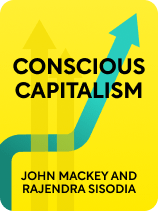
What’s the solution to capitalism? Does capitalism need to be replaced or can it be improved?
Capitalism has come under scrutiny in recent years, and while capitalism is theoretically sound, it’s misunderstood and implemented poorly. Thankfully, Conscious Capitalism by John Mackey and Rajendra Sisodia has the solution to capitalism.
Here’s how Mackey and Sisodia would fix capitalism with an improved version.
How Conscious Capitalism Addresses Common Critiques of Capitalism
Mackey and Sisodia argue that the solution to capitalism is conscious capitalism. Businesses must align their actions with society’s ever-advancing ideals, or else they’ll fail. The authors explain that over the last 200 years, people have become more enlightened—and as their values, knowledge, and connections to one another have improved, society has become increasingly free of cruelty and violence. Most people want society to continue improving in this way, so they reject businesses that perpetuate cruelty and violence—and they’re more critical of variants of capitalism that enable businesses to do so.
(Shortform note: In his book Enlightenment Now, psychologist Steven Pinker explains why the world is becoming an increasingly more enlightened—and more enjoyable—place. He explains that the process began in the 17th century with the onset of the Age of Enlightenment—a period characterized by a newfound philosophical focus on how to use reason, science, and humanism to improve living conditions for all humanity. He argues that this focus on progress has led to overall advances in the well-being of people and societies, and that it will inevitably lead to a healthier global environment, too. In the interest of furthering human progress, most people believe businesses have a duty to help make the world a better place, according to some studies.)
According to Mackey and Sisodia, to align their actions with society’s values, businesses must practice “conscious capitalism”: a business model that benefits all interested parties, from customers to investors to society and the environment. The authors say that conscious capitalism is true to the theoretical basis of capitalism because the ultimate goal of businesses who practice it is to satisfy everyone involved—under distorted forms of capitalism, the ultimate goal of a business is to make money, and it only satisfies interested parties as a means to do that.
(Shortform note: “Conscious capitalism” is the name Mackey and Sisodia give to their version of stakeholder capitalism—a form of capitalism that aims to serve the interests of all stakeholders. Experts note that several notable businesspeople have promoted similar ideas using different terms, including “compassionate,” “moral,” “shared-value,” and “inclusive” capitalism. Central to all kinds of stakeholder capitalism is the idea that businesses should be doing more to promote global well-being—but economists disagree as to whether they’re truer to the theoretical basis of capitalism, with some arguing in favor of shareholder theory (which prioritizes the interests of those who own company stock) instead.)
Since conscious capitalism benefits everyone, the authors say it nullifies the three common critiques of capitalism listed above—and it doesn’t perpetuate cruelty or violence.
(Shortform note: Conscious Capitalism Inc.—a nonprofit founded by the authors to promote their ideas—clarifies that businesspeople who practice conscious capitalism may have conflicting values and beliefs about what’s needed to make the world a better place—therefore, they may have different ideas about what constitutes cruelty or violence. This was highlighted at the 2016 Conscious Capitalism CEO Summit, which featured, for example, representatives from Ben & Jerry’s and Chick-fil-A, companies that have been recognized for their pro- and anti-LGBT stances, respectively.)
The authors also argue that since everyone benefits from conscious capitalism, this model has the potential to empower all people around the world to flourish if it’s widely practiced. As a result of their flourishing, everyone will have the ability to contribute innovative solutions to contemporary problems—which means that ultimately, conscious capitalism is capable of solving any problem we encounter.
(Shortform note: While Mackey and Sisodia believe that conscious capitalism can empower people to innovatively solve contemporary problems, some doubt whether any form of stakeholder capitalism is the ultimate solution. For example, socialists argue that all forms of capitalism necessitate consumerism, which inevitably leads to climate change—so no form of capitalism can adequately address climate change. Socialists also argue that socialism promotes creativity, innovation, and motivation to work at least as well as capitalism—so it may be a viable alternative economic system insofar as solving contemporary problems goes.)

———End of Preview———
Like what you just read? Read the rest of the world's best book summary and analysis of John Mackey and Rajendra Sisodia's "Conscious Capitalism" at Shortform.
Here's what you'll find in our full Conscious Capitalism summary:
- That capitalism is inherently good for people, but we're doing it wrong
- How conscious capitalism benefits both consumers and businesses
- How to meet the interests of all parties without sacrificing anyone's needs






